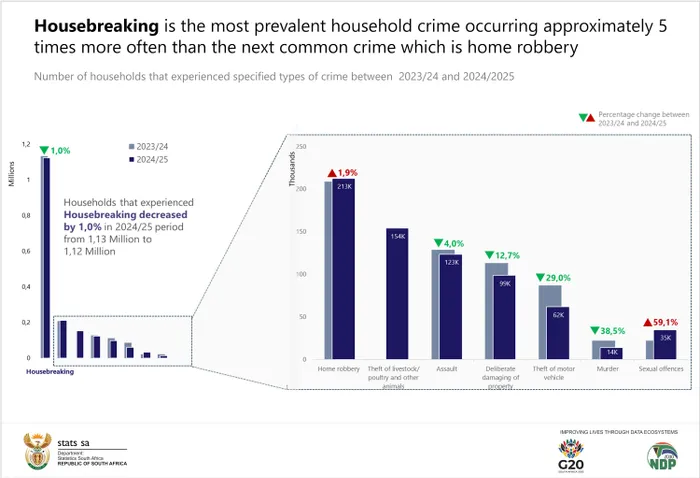Why are thousands of South Africans silent on housebreaking and theft?

Thousands of South Africans don't report crime.
Image: SAPS
The Statistics South Africa print found that housebreaking remained the most experienced crime affecting South African households in 2024/25, based on the agency’s research, followed by home robbery.
Male-headed households and those living in KwaZulu-Natal province were most affected.
During the research period, the 2024/25 year, an estimated 1.5 million incidents of housebreaking occurred, representing 5.7% of all households in the country.
Housebreaking was one of the least reported household crimes to the police, with only about 43% of affected households taking cases to the police – almost the same proportion as the previous year.

Housebreaking/burglary has consistently been the most common crime experienced by households in South Africa
Image: Stats SA
The latest from Statistics South Africa’s Governance, Public Safety and Justice Survey (GPSJS) survey shows that thousands of people are not reporting crimes to the South African Police Services (SAPS).
“Crime remains one of the defining challenges of life in South Africa, cutting across geography, gender and economic status,” Statistics South Africa said.
It added that, regardless of whether people were living in “bustling metropolitan centres or small rural towns, households and individuals continue to face the risk of break-ins, robberies, theft and other crimes that disrupt daily life”.
SAPS’ January to March 2025 data showed significant decreases in contact crimes like murder (down 12.4%), robbery with aggravating circumstances (down 10.4%), and carjacking (down 15.1%) on a year-on-year basis.
“Despite this, perceptions of safety have improved slightly,” Statistics South Africa said.
The survey showed that 81% of people aged 16 and older felt safe walking alone in their neighbourhoods during the day in 2024/25, compared with 80,4% in 2023/24.
When looking at individuals, theft of personal property was the most common crime in 2024/25. Yet, the number of those affected declined 100 000 between survey periods to 1.2 million. Thefts were most likely to affect males and people living in metro areas.
An estimated 1.3 million incidents of personal theft took place, affecting about 1.2 million individuals, indicating that some people were attacked twice.
The figure, Statistics South Africa said, was equal to 2.6% of the population aged 16 and older.
However, most victims chose not to report these crimes: 69% chose not to report, while just 31% reported some or all incidents to the police.
Consumer fraud showed a different trend. Incidents rose sharply from 552 000 in 2023/24 to 811 000 in 2024/25. “Encouragingly, the share of victims reporting to police also increased from 30.7% to 34.9%,” said Statistics South Africa.
The proportion of adults aged 16 and older who felt safe walking alone in their neighbourhoods during the day declined from 85% in 2020/21 to 80.4% in 2023/24, before edging up slightly to 81% in 2024/25.
By contrast, fewer South Africans reported feeling safe when walking after dark: only 36.1% in 2024/25, up marginally from 34.9% the previous year, but still well below the 39.6% recorded in 2020/21.
IOL Business